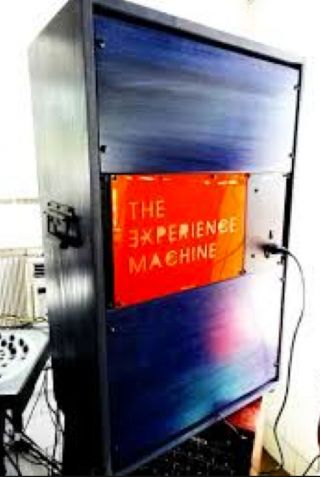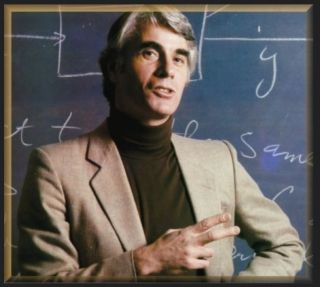
Brian: "How are you doin'?" David: "Livin' the dream, baby, livin' the dream." [Vanilla Sky]
Happy is the man, I thought, who, before dying, has the good fortune to sail the Aegean Sea.~ Kazantzakis; Zorba the Greek
If they have only one wish for their children, most parents want them to be happy. Barring some strange cross-generational asymmetry, parents’ own happiness should be their own last remaining wish as well, after all else is gone. Without naming names, philosopher Robert Nozick (1981; 1989) asserted that “some theorists have claimed that happiness is the only important thing about life” (ital. in orig.) Nozick then proceeds to demolish the credibility of this claim. His method of attack is to ask what if you got what you wished for. What if you could gather all the happiness you wanted without cost and without risk? True to philosophical practice, Nozick proposes a thought experiment. He asks us to imagine an “experience machine,” a device we can plug in and have happiness delivered. Let me quote his description of this EM in full [This and all other quotes come from the 2006 edition of “Examined”].
When connected to this experience machine, you can have the experience of writing a great poem or bringing about world peace or loving someone or being loved in return. You can experience the felt pleasures of these things, how they “feel from the inside.” You can program your experiences for tomorrow, or this week, or this year, or even for the rest of your life. If your imagination is impoverished, you can use the library of suggestions extracted from biographies and enhanced by novelists and psychologists. You can live your fondest dreams “from the inside.” Would you choose to do this for the rest of your life? If not, why not? [. . . ] The question is not whether to try the machine temporarily, but whether to enter it for the rest of your life. Upon entering, you will not remember having done this; so no pleasures will be ruined by realizing they are machine-produced (pp 104-105).

Nozick believes that no sane person would enter the EM. What the person wants, “is not merely take pleasure in [the experiences]; he wants them to be so." Nozick thereby raises a question of value. “What we want and value is an actual connection with reality." He is saying “that the connection with reality is important whether or not we desire it – that is why we desire it – and the experience machine is inadequate because it doesn’t give us that."
In rejecting the EM, Nozick and like-minded others choose not to maximize happiness. This choice is striking because it would not be remembered once the EM chugs into action. A person involuntarily hooked up to the EM would not remember his preference for reality. Nozick is claiming that the value placed on realistic experience is an objective one. It does not depend on one’s conscious awareness of it.
This is a lofty claim, and a hard one to defend. If you are happy without knowing that you are floating inside an illusion, you can – by definition – not be bothered by it. Nozick tries, without being fully convincing and knowing it, to anchor the value of reality in shared experience. “One of the distressing things about the experience machine, as described, is that you are alone in your particular illusion." He does not say why this is distressing. Indeed, the distress can only be felt by those of us who are contemplating the EM; not by those in it. Likewise, the claim that “when all are floating in the same tank, the experience machine may not be as objectionable, but it is objectionable nonetheless” refers only to the outside view.
When I described the EM to my 15-year-old daughter Stéphanie, she objected to it on the grounds that no one would want to be around a person who is in it. She thereby reframed the question from the observer’s point of view. For any one person entering the EM, the happiness for all others drops because they can no longer interact with the EM’ers effectively – let alone bear the annoyance of being around the chronically blissed out. The EM is undesirable from the collective point of view. What if, however, all are in the EM? Nozick says this would be less objectionable and Stéphanie’s concern would be moot. Should we not want a society in which everyone is always happy? To say that this utopia is actually a dystopia, one may point out that people would not get anything done. They would feel the elation of having written great poems, but no great poems would actually be written. Life as we know it would come to a standstill.
Nozick argues that reality matters and that we know it. We want to be connected with things that actually happen and actually exist. He presents this claim as being self-evident, but why is it that we care about reality? Perhaps the answer is this: The EM as described is derivative of reality. To program the experience of having sailed the Aegean Sea demands a reality referent. Only if we know what it feels to sail the Aegean can we simulate the experience. If we alternatively assume that there is no reality, and that we might all happily reside in an EM, then the premise of Nozick’s thought experiment is negated, and we cannot make a choice between EM and Not-EM. Granted, my answer is still tautological. People prefer a connection with reality to pure simulation because reality is truer and more actual than a dream.
What if the EM were modified so that once hooked up, people would falsely remember that they had been given a choice to plug in and that they had rejected it. Knowing this outcome, Nozick would still argue that he and other sane individuals would refuse to plug in. According to him, reality still dominates objectively, regardless of how deep the illusion is.
Nozick’s belief that most people would reject the EM is well taken. Surveying an online sample of respondents, Professor Alexandra Freund of the University of Zurich, Switzerland, found that 4 out of 5 would decline to take a pill that would ensure lasting happiness. Speculating about the meaning of these unpublished data, Freund suggests that states of (un)happiness serve as a signaling system. They tell us how the important things in our lives are going. Thereby, they are critical in telling us what to do next. Yet, this cannot be the whole story. Suppose you sign up for Nozick’s EM or Freund’s pill, knowing that you will not be visited by grief when a loved one dies. I suspect that few individuals would elect to replace grief with happiness at a time of death. The experience of grief does not so much guide behavior as it guides reflection. It brings to mind the value of what has been lost. Good grief (pardon this horrendous pun) is intense but brief in duration. It helps the grieving individual understand who they are and their place within their social world. Nozick recognizes these hidden values of painful emotions. They support the construction of a coherent personal narrative by providing “depth.”
To Nozick, both happy and unhappy emotions gain value from being a “fitting” responses to reality. “If the emotion does fit our life, then the component beliefs about our life as a whole will be true and the component positive evaluation will be correct. Hence, we will have a life that is valuable, one it is correct to evaluate positively." If it is not this, it is “bovine contentment or frivolous amusements." Nozick quotes Mill, who put it bluntly: “It is better to be human dissatisfied than a pig satisfied; better to be Socrates satisfied than a fool satisfied."
To the theologically inclined, a puzzle appears. If life grounded in reality is the highest value, then why bother with rewards on the yonderside? The Christian heaven quite looks like a kind of experience machine. Good feelings prevail but nothing really happens. If most people – like Nozick – think that empty bliss is more empty than bliss, why offer it as a reward to be gathered after real life? Does not a reward have to be valued more highly than whatever it is given for? It is not surprising that the faithful have not chosen mass suicide.
Nozick R. (1981). Essays on anarchy, state, and utopia. Totowa, NJ: Rowman & Littlefield.
Nozick, R. (1989/2006). The examined life. New York: Simon & Schuster.




